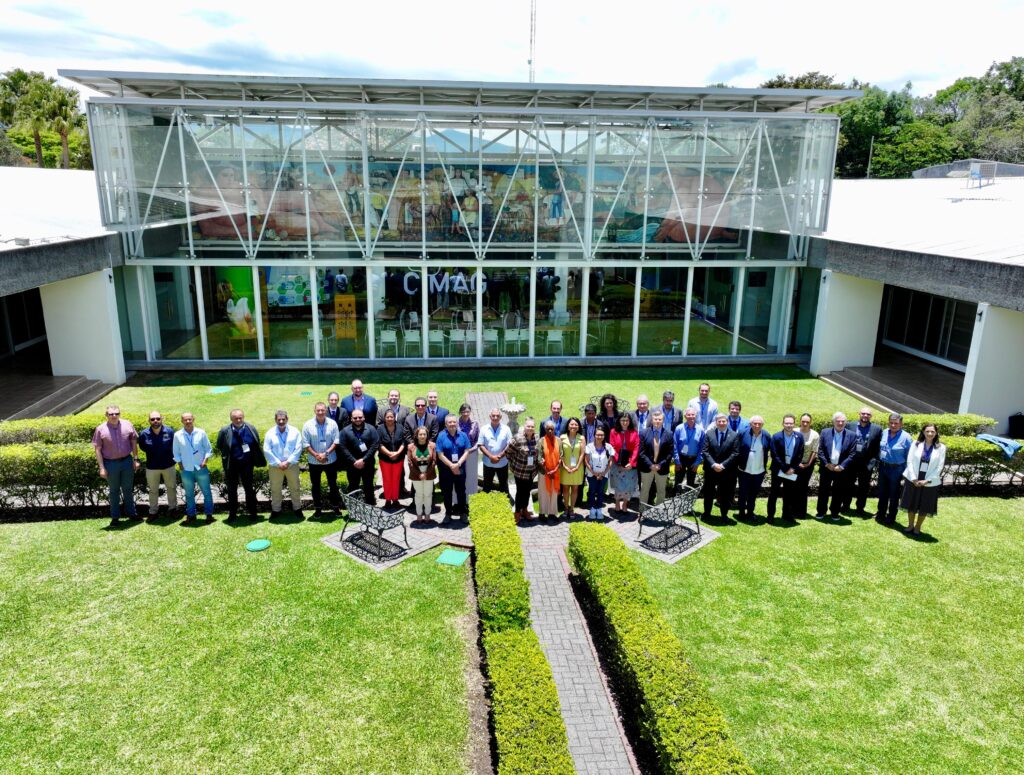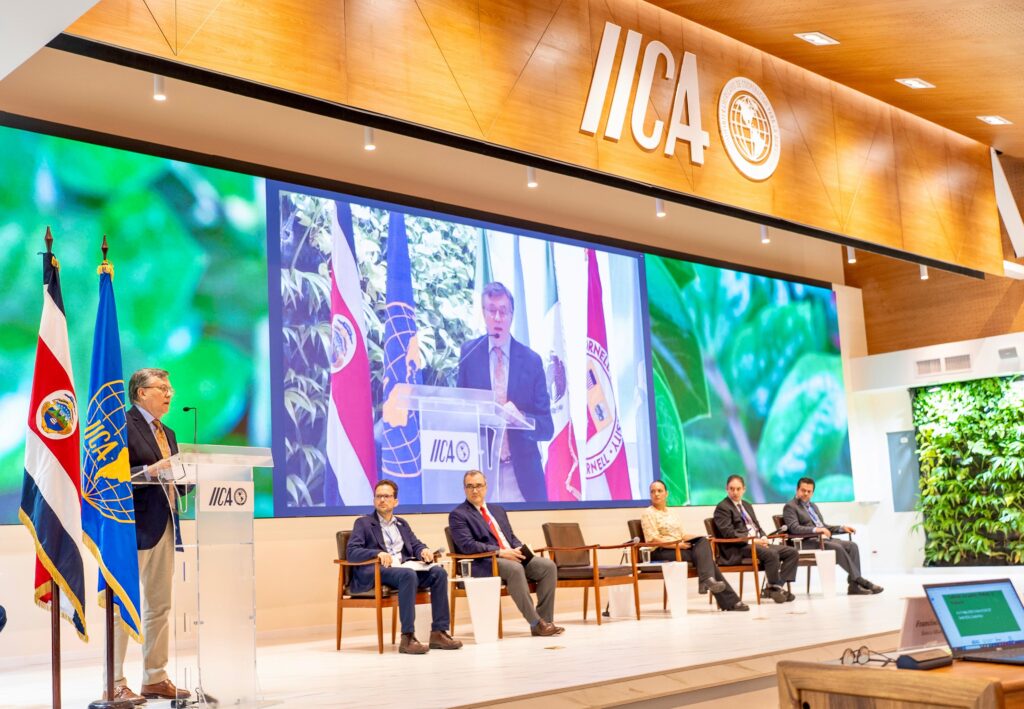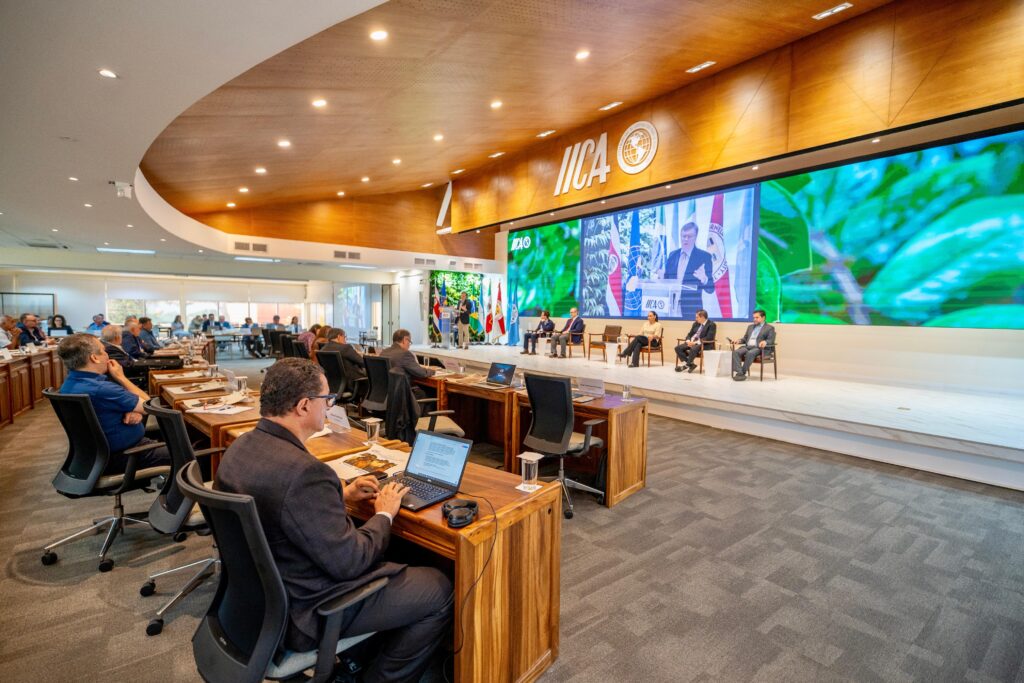
The main purpose of the event is to create a permanent discussion forum and establish a joint research agenda on these key issues.
San Jose, 7 May 2025 (IICA) – Strengthening small farmers’ organizations is key to enabling this sector to play a more prominent role in transforming agriculture in Latin America and the Caribbean. This was one of the main takeaways of a meeting among family farming representatives, authorities and researchers from international organizations, professionals and policymakers, held at the headquarters of the Inter-American Institute for Cooperation on Agriculture (IICA).
Participants of the two-day hemispheric conference will discuss the scope, challenges and future of small farmers’ organizations as business entities in the region.
The Tata-Cornell Institute for Agriculture and Nutrition, the World Bank, the International Fund for Agricultural Development (IFAD), FONTAGRO and IICA, which organized the event, have undertaken the goal to create a permanent discussion forum and establish a collaborative research agenda on these issues.
Among the participants are representatives of cooperatives, associative enterprises, the private sector and NGOs, as well as public sector officials. Prominent figures include the Secretary of Agriculture and Livestock of Honduras, Laura Suazo, and the Deputy Ministers of Agriculture of Paraguay and Guatemala, Rossana Ayala and Klemen Gamboa, respectively.
The plenary sessions and panel discussions, which are led by regional experts and apply a participatory approach, will foster dialogue on the characteristics of the most common types of small producers’ organizations in Latin America, the social and economic factors that drive or hinder their development, and what is being done to improve the representation of vulnerable groups.
Participating in the session were Leslie Verteramo, of Tata-Cornell; Luiz Marques, of IFAD; Francisco Bueso, of the World Bank; Roberto Camacho Montero, of the National Institute of Agricultural Technology (INTA) of Costa Rica and Representative at FONTAGRO; Andrea Padilla, of FAO; and Manuel Otero, Director General of IICA.
Also in attendance were Julio César Duarte, Ambassador of Paraguay in Costa Rica, and Lloyd Day, Deputy Director General of IICA. Verteramo and Mario León, Manager of Territorial Development and Family Farming at IICA, were the main organizers of the event.

Participants of the two-day hemispheric conference will discuss the scope, challenges and future of small farmers’ organizations as key rural business entities in the region.
Forum for ongoing dialogue
“This idea originated over a year ago, out of the need to study the organization of small-scale farmers in Latin America”, said Verteramo, who explained that the Tata-Cornell Institute, based at Cornell University in the state of New York, initially focused on improving the productivity and living conditions of small-scale farmers in India, but later expanded.
“Our proposal is to establish a forum for dialogue in Latin America, to share experiences that can benefit the value chains of small producers’ organizations. We would begin by organizing a series of conferences, but the idea is to create a permanent forum to be held every two years”, he stated.
On behalf of IFAD, Luiz Marques stated that strengthening rural territories should be a priority objective of international agencies and governments. “It is important that we share our experiences, common challenges in our region, and how to find solutions at the territorial level”, he noted.
Francisco Bueso, Agriculture Specialist at the World Bank, considered it crucial to create a forum that affords the opportunity to listen to representatives of small farmers’ organizations and governments. “This would allow us to better understand how we can improve our technical and financial support to initiatives in the territories. Even though we have been doing this for more than 20 years, we can become more effective”, he said.
Camacho Montero, speaking on behalf of FONTAGRO, a regional cooperation mechanism that supports innovation and the sustainability of family farming, and INTA of Costa Rica, highlighted Manuel Otero’s leadership as Director General of IICA. “Those of us who work in the public sector owe ourselves to producers, but especially to small-scale producers. They are our raison d’être, because we recognize the positive impact of their work in the territories. Experience tells us that when they are well organized, they achieve an even greater impact”, he said.
“Family farming is especially vulnerable to extreme weather events, which affects productivity and food security in our region. This affects rural areas in particular, where difficulties are even greater. Family farming faces multiple challenges, such as limited access to infrastructure and financial resources, lack of technology and land tenure issues”, said Andrea Padilla of FAO.

Family farming representatives, authorities, researchers and policymakers meeting at IICA Headquarters agreed that strengthening small farmers’ organizations is key to enhancing their role in transforming agriculture in Latin America and the Caribbean.
The soul of rural areas
The IICA Director General underscored the importance of public policies that support small-scale farmers: “The 15 million family farmers in our region are the social fabric that gives life to rurality. Latin America has undergone the largest urbanization process in the world. Only 18% of the population remains in rural areas, and this includes family farmers, who are the soul of rurality. It is crucial to discuss how they can better organize themselves to evolve in such a complex scenario and in a region where the lights of the big cities dominate the political scene”.
Otero added that Latin America’s megacities, which have more than 10 million inhabitants, require 6,000 tons of food per day and that is why we must turn our gaze to rural areas, which produce that food. “Achieving a transformative vision for a new rurality requires greater conviction. Small-scale farmers are tied to their territories and their culture. They are so much more than producers: they are the custodians of rural areas and guardians of biodiversity. Our vision for the future must include family farmers”, he stressed.
More information:
Institutional Communication Division.
comunicacion.institucional@iica.int











